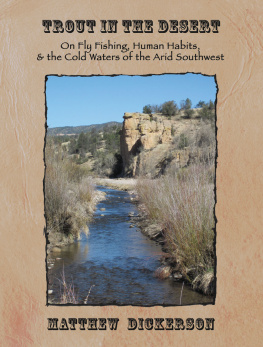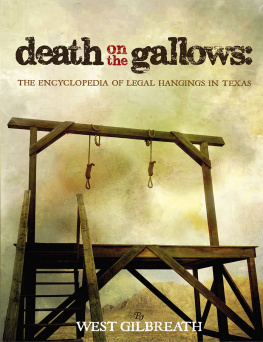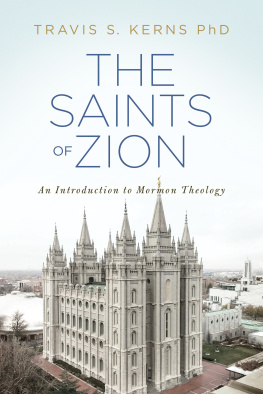Matthew Kerns - Texas Jack
Here you can read online Matthew Kerns - Texas Jack full text of the book (entire story) in english for free. Download pdf and epub, get meaning, cover and reviews about this ebook. year: 2021, publisher: TwoDot, genre: Home and family. Description of the work, (preface) as well as reviews are available. Best literature library LitArk.com created for fans of good reading and offers a wide selection of genres:
Romance novel
Science fiction
Adventure
Detective
Science
History
Home and family
Prose
Art
Politics
Computer
Non-fiction
Religion
Business
Children
Humor
Choose a favorite category and find really read worthwhile books. Enjoy immersion in the world of imagination, feel the emotions of the characters or learn something new for yourself, make an fascinating discovery.

- Book:Texas Jack
- Author:
- Publisher:TwoDot
- Genre:
- Year:2021
- Rating:3 / 5
- Favourites:Add to favourites
- Your mark:
- 60
- 1
- 2
- 3
- 4
- 5
Texas Jack: summary, description and annotation
We offer to read an annotation, description, summary or preface (depends on what the author of the book "Texas Jack" wrote himself). If you haven't found the necessary information about the book — write in the comments, we will try to find it.
Texas Jack — read online for free the complete book (whole text) full work
Below is the text of the book, divided by pages. System saving the place of the last page read, allows you to conveniently read the book "Texas Jack" online for free, without having to search again every time where you left off. Put a bookmark, and you can go to the page where you finished reading at any time.
Font size:
Interval:
Bookmark:

Matthew Kerns is a historian, web developer, and digital archivist who lives with his wife and children in Chattanooga, Tennessee. His most recent public project is the Walter Becker Media Project (walterbecker-media.com), as reported in Rolling Stone . He manages a blog, YouTube channel, the popular Western podcast Dime Library (dimelibrary.com), and the Texas Jack Facebook page (facebook.com/jbomohundro). He has had multiple articles about Texas Jack published in The Texas Jack Scout , the triannual publication of the Texas Jack Association.
A TWODOT BOOK
An imprint and registered trademark of The Rowman & Littlefield Publishing Group, Inc.
4501 Forbes Blvd., Ste. 200
Lanham, MD 20706
www.rowman.com
Distributed by NATIONAL BOOK NETWORK
Copyright 2021 by Matthew Kerns
All rights reserved. No part of this book may be reproduced in any form or by any electronic or mechanical means, including information storage and retrieval systems, without written permission from the publisher, except by a reviewer who may quote passages in a review.
British Library Cataloguing in Publication Information available
Library of Congress Cataloging-in-Publication Data
Names: Kerns, Matthew, 1979- author.
Title: Texas Jack : Americas first cowboy star / Matthew Kerns.
Other titles: Americas first cowboy star
Description: Guilford, Connecticut : TwoDot, [2021] | Includes bibliographical references and index.
Identifiers: LCCN 2020054577 (print) | LCCN 2020054578 (ebook) | ISBN 9781493055418 (cloth) | ISBN 9781493055425 (epub)
Subjects: LCSH: Omohundro, John Burwell, 1846-1880. | CowboysWest (U.S.)Biography. | Buffalo Bill, 1846-1917Friends and associates. | EntertainersUnited StatesBiography. | Wild west showsUnited StatesHistory. | Scouts (Reconnaissance)West (U.S.) Biography. | Frontier and pioneer lifeWest (U.S.) | West (U.S.)Biography.
Classification: LCC F594.O5 .K47 2021 (print) | LCC F594.O5 (ebook) | DDC 978/.020922 [B]dc23
LC record available at https://lccn.loc.gov/2020054577
LC ebook record available at https://lccn.loc.gov/2020054578
 The paper used in this publication meets the minimum requirements of American National Standard for Information SciencesPermanence of Paper for Printed Library Materials, ANSI/NISO Z39.48-1992.
The paper used in this publication meets the minimum requirements of American National Standard for Information SciencesPermanence of Paper for Printed Library Materials, ANSI/NISO Z39.48-1992.
To my dad and my mom who took us West
My dear fellow, sit down. Were I to dare to tell you my adventures, they would fill a stack of books that would reach as high as the Bunker Hill Monument, and be as full of fire as the eruptions of Vesuvius. It is almost impossible for me to give you any idea of scout life; for where shall I begin or leave off? But Ill tell you what I am going to do this summer...
TEXAS JACK
MANY OF THE SOURCES QUOTED IN THIS BOOK USE TERMS AND PHRASES that are rightly considered racist by the standards of today. Racist terminology used to describe Native Americans, including variations on the words redskin, Injun, savage, squaw, and several others are present throughout quoted text and speak to the prevailingthough thankfully not universalsentiment of the time. Similarly, slaves on a Virginia plantation are referred to in a quoted newspaper piece as darkies. The author would like to strongly state that these words are quoted verbatim for accuracy and context and do not express in any way his views on either Native Americans or people of color.
Where possible, Native American people have been identified by tribe and by name in both their own language and in English, and the names of historic conflicts such as the Battle of the Little Bighorn are also referred to by the English versions of their native names, i.e., the Battle of the Greasy Grass.
IT COULD BE A SCENE IN ANY HOLLYWOOD WESTERN. BEFORE THE break of dawn on a cool spring morning, a civilian scout and his cowboy friend ride out of a frontier army fort in pursuit of a party of Indian raiders. The raiders absconded with the horses from the armys telegraph station the night before and raced north, across the prairie toward relative safety beyond the rivers northern branch. Close behind the scout and the cowboy rode two squadrons of soldiers. Their captain assured his men that the pair at the lead could read the signs and follow the trail of their enemies.
After breaking camp in the cold predawn hours and a hard ride of many miles across the unbroken prairie, the scout and the cowboy abruptly stopped ahead of the troops, conversing as they pointed into the distance. They rode back to tell the captain that the Indians and their stolen horses were just on the other side of the river. The scout proposed to proceed with a small number of men toward the enemy encampment while the cowboy took the larger force around from the north, surrounding the natives and cutting off their escape. Soon the cavalry was split, and as the flanking column led by the cowboy wended its way into position, gunfire erupted from the direction of the camp. The cowboy immediately put heel to horseflesh, charging toward the sound of rifle shot, followed by the pounding hooves of the troops mounts as they rushed toward the scout and his smaller contingent now engaged in combat.
The scout had just fired his .50 caliber trapdoor needle gun at one of the mounted braves when he felt fire blaze across his scalp, followed by the blinding flow of blood pouring across his forehead. Frantically wiping the warm blood from his eyes, he looked in the direction of the shot. There he saw the warrior who had pulled the trigger falling to the earth, a bullet fired from the weapon of the mounted cowboy lodged in his brain. Had the cowboy fired a second later, the scout knew, the shot meant to end his life would not have missed. The cavalry troops rounded up the remaining braves, and the scout bandaged his wound while the cowboy showed the ranking officer the tracks indicating the larger force of Indians that had recently camped in the area.
The captains report to his superior officers about the incident noted that the scouts reputation for bravery and skill as a guide is so well established that I need not say anything else than but he acted in his usual manner. The cowboy, he said, is a very good trailer and a brave man, who knows the country well, and I respectfully recommend his employment as a guide should the service of one... be needed.

The idea of encounters like thisof cowboys fighting Indians on the outskirts of civilizationis so ingrained in the collective conscience that the scenario seems not merely plausible but possibly clichd. The tropic cowboy captures all of American history and virtue reduced to a central mythic figure comprising a set of beliefs: The cowboy fought Indians. The cowboy was a rugged individualist. The cowboy played a significant role in American history. The cowboy fought in gunfights. The cowboys life was full of excitement.
The reality of the cowboy stands in contrast with romantic depictions in stories and movies. By the time of the big Texas cattle drives of the late 1860s, herders meticulously avoided native territories, despite the decimation of native populations between Texas and Kansas by disease and the relegation of Native Americans to reservations. Ranch owners entrusted their cowboys with the care of their valuable stock. Ensuring the value of their charges during transportation made cowboys more akin to modern truck drivers than leather-clad knights. Cattle drives along the Chisholm Trail, Goodnight-Loving Trail, and others lasted only from 1866 until the mid-1880s when a combination of rail lines and hundreds of miles of barbed-wire fence rendered the job of trail-driving cowboy obsolete. During the scant twenty years of cowboy primacy, swift streams swollen by rain, lightning, falls from horseback, and disease accounted for the majority of cowboy deaths. A cowboy was more likely to draw his gun on a farmer than on another cowboy or card cheat across a town square at high noonmore likely to fire his rifle at a coyote than a Comanche (N u m u n uu ) brave. Dust and tedium were the rule of a cowboys work, as was enduring the worst of conditions to ensure top dollar for beef.
Font size:
Interval:
Bookmark:
Similar books «Texas Jack»
Look at similar books to Texas Jack. We have selected literature similar in name and meaning in the hope of providing readers with more options to find new, interesting, not yet read works.
Discussion, reviews of the book Texas Jack and just readers' own opinions. Leave your comments, write what you think about the work, its meaning or the main characters. Specify what exactly you liked and what you didn't like, and why you think so.





